Dremel Versaflame 2200 User Manual
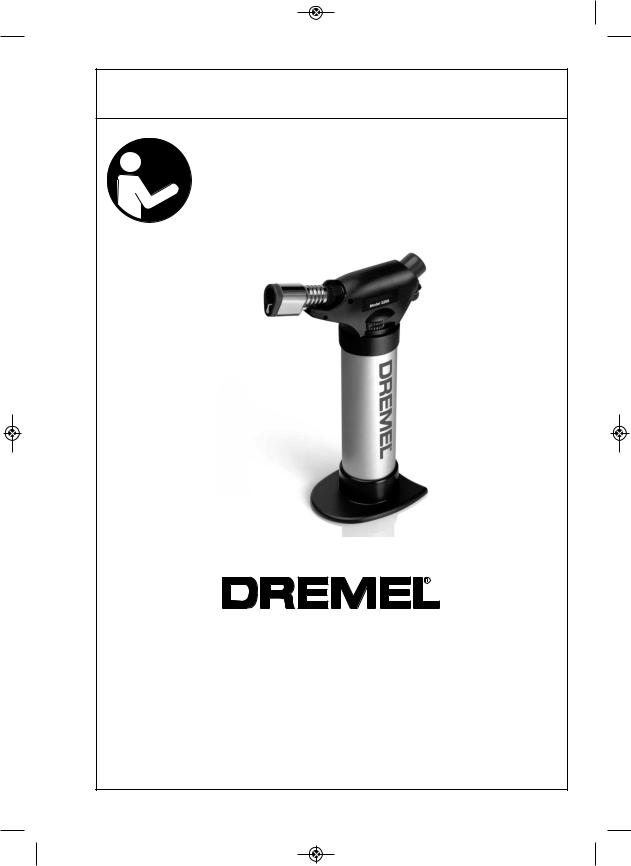
 DM 2610Z06358 A5 05-14_2200 5/7/14 1:18 PM Page 1
DM 2610Z06358 A5 05-14_2200 5/7/14 1:18 PM Page 1
IMPORTANT: |
IMPORTANT : |
IMPORTANTE: |
Read Before Using |
Lire avant d'utiliser |
Leer antes de usar |
|
|
|
Operating/Safety Instructions 
 Consignes de sécurité/d’utilisation
Consignes de sécurité/d’utilisation
Instrucciones de funcionamiento y seguridad
VersaFlame 2200
P.O. Box 081126 Racine, WI 53408-1126
|
Call Toll Free for |
Pour obtenir des informations |
Llame gratis para |
|
|
Consumer Information |
et les adresses de nos centres |
obtener información |
|
||
|
& Service Locations |
de service après-vente, |
para el consumidor y |
|
|
|
|
appelez ce numéro gratuit |
ubicaciones de servicio |
|
|
|
|
|
|
||
|
1-800-4-DREMEL (1-800-437-3635) www.dremel.com |
|
|
||
|
|
|
|
|
|
For English Version |
Version française |
Versión en español |
|
||
|
See page 2 |
Voir page 11 |
Ver la página 20 |
|
|
|
|
|
|
|
|

 DM 2610Z06358 A5 05-14_2200 5/7/14 1:18 PM Page 2
DM 2610Z06358 A5 05-14_2200 5/7/14 1:18 PM Page 2
Safety Warnings
READ ALL INSTRUCTIONS
SAVE ALL WARNINGS AND INSTRUCTIONS FOR FUTURE REFERENCE
|
|
Read all instructions in |
|
! |
DANGER |
||
this manual and familiarize |
|||
|
|
yourself with the torch before lighting and using it. Failure to comply with the warnings and instructions may result in fire or an explosion that may result in property damage, serious personal injury or death.
Tank contains extremely flammable gas under pressure.
Keep torch out of reach of children and anyone who has not read these Operating/Safety Instructions.
Do not point the torch flame or torch exhaust port towards your face, other persons, or flammable items.
Take precautions not to heat the fuel tank.
Do not expose the torch or fuel to temperatures exceeding 120°F/49°C or prolonged sunlight.
Never use the torch in or around flammable fumes, liquids, or explosive materials.
Never leave the torch unattended when lit. Make sure the torch is completely extinguished after use.
Never pierce the fuel tank or expose torch to external flame.
Never attempt to repair or heat any containers that held flammable liquid, gas, or any chemical. Heating these containers can result in fire or explosion.
Never use the torch near combustibles (fuels, rags, towels, paper products, etc.). Be careful around motor vehicles or any gasoline-fired products and beware of hidden fuel lines and tanks.
Be sure the torch is not pointed toward objects that may ignite when the torch is set down.
Do not breathe gas, fumes, vapor, or spray. If inhaled, remove affected person to fresh air. Always use torch in a wellventilated area.
Wear a respirator when working on applications where toxic or nauseating vapors may exist. Avoid the fumes from fluxes, lead-based paint, and all metal heating operations. Fumes from cadmium plating and galvanized metal may be present.
Avoid fuel contact with eyes or skin. In case of contact with eyes, rinse immediately with plenty of water and seek medical advice. For skin contact, flush with large amounts of water.
Always protect torch from impact, or dropping onto floor or hard surfaces. Never use the torch if damage is suspected.
Do not modify torch or alter factory settings in any way.
Always use manufacturer recommended replacement parts.
Read refueling instruction before refueling torch.
Do not smoke while filling, refilling, or operating the torch.
-2-

 DM 2610Z06358 A5 05-14_2200 5/7/14 1:18 PM Page 3
DM 2610Z06358 A5 05-14_2200 5/7/14 1:18 PM Page 3
Before using, check all ! WARNING parts for proper function
and damage to component parts.
Do not use this torch to heat, mold, or bend plastic sheets, molding or tubing.
Hidden areas such as behind walls, ceilings, floors, soffit boards and other panels may contain flammable materials that could be ignited by the heat gun when working in these locations. The ignition of these materials may not be readily apparent and could result in property damage and injury to persons.
When working in these locations, keep the torch moving in a back-and-forth motion. Lingering or pausing in one spot could ignite the panel or the material behind it.
Extreme care should be taken when stripping paint. The peelings, residue and vapors of paint may contain lead, which is poisonous. Any pre-1977 paint may contain lead and paint applied to homes prior to 1950 is likely to contain lead. Once deposited on surfaces, hand to mouth contact can result in the ingestion of lead. Exposure to even low levels of lead can cause irreversible brain and nervous system damage; young and unborn children are particularly vulnerable. Before beginning any paint removal process you should determine whether the paint you are removing contains lead. This can be done by your local health department or by a professional who uses a paint analyzer to check the lead content of the paint to be removed. LEAD-BASED PAINT SHOULD ONLY BE REMOVED BY A PROFESSIONAL AND SHOULD NOT BE REMOVED USING A TORCH.
Persons removing paint should follow these guidelines:
1)Move the work piece outdoors. If this is not possible, keep the work area well ventilated. Open the windows and put an exhaust fan in one of them. Be sure the fan is moving the air from inside to outside.
2)Remove or cover any carpets, rugs, furniture, clothing, cooking utensils and air ducts.
3)Place drop cloths in the work area to catch any paint chips or peelings. Wear protective clothing such as extra work shirts, overalls and hats.
4)Work in one room at a time. Furnishings should be removed or placed in the center of the room and covered. Work areas should be sealed off from the rest of the dwelling by sealing doorways with drop cloths.
5)Children, pregnant or potentially pregnant women and nursing mothers should not be present in the work area until the work is done and all clean up is complete.
6)Wear a dust respirator mask or a dual filter (dust and fume) respirator mask which has been approved by the Occupational Safety and Health Administration (OSHA), the National Institute of Safety and Health (NIOSH), or the United States Bureau of Mines. These masks and replaceable filters are readily available at major hardware stores. Be sure the mask fits. Beards and facial hair may keep masks from sealing properly. Change filters often. DISPOSABLE PAPER MASKS ARE NOT ADEQUATE.
7)Use caution when operating the torch. Keep the torch moving, as excessive heat will generate fumes, which can be inhaled by the operator.
8)Keep food and drink out of the work area. Wash hands, arms and face and rinse mouth before eating or drinking. Do not smoke or chew gum or tobacco in the work area.
9)Clean up all removed paint and dust by wet mopping the floors. Use a wet cloth to clean all walls, sills and any other surface where paint or dust is clinging. DO NOT SWEEP, DRY DUST OR VACUUM. Use a high phosphate detergent or trisodium phosphate (TSP) to wash and mop areas.
10)At the end of each work session put the paint chips and debris in a double plastic bag, close it with tape or twist ties and dispose of properly.
11)Remove protective clothing and work shoes in the work area to avoid carrying dust into the rest of the dwelling. Wash work clothes separately. Wipe shoes off with a wet rag that is then washed with the work clothes. Wash hair and body thoroughly with soap and water.
Never attempt to use torch as a cigarette, cigar, or pipe lighter.
-3-

DM 2610Z06358 A5 05-14_2200 5/7/14 1:18 PM Page 4
Always wear eye protection when lighting and using the torch.
Keep your hair, and clothing away from the flame. Loose clothes or long hair can catch fire. Hot solder may cause burns.
Use only liquid butane fuel when filling or refilling torch.
Before each use and after refilling, inspect for leaks. Never use a flame to check for leaks. If leak is suspected use soapy water solution and look for continuous bubbling.
Ignite torch away from face, hands, clothing, or other flammable material.
To extinguish torch the lock-on button must be in the unlocked position.
Pressing and releasing the ignition button will not extinguish the torch if the lock on button was moved to the lock on position during use.
Discontinue gas flow if torch is extinguished accidentally.
Always check to make sure that unintended parts or materials are not being heated. Heat may be conducted to near objects or substances that may ignite or become pressurized when heated.
Use OSHA specified coating removal methods when preparing metal work pieces for heating.
Always make sure the torch is resting securely on its stand when handling work with both hands. Tank without stand does not provide stable support.
Do not touch the torch flame guard, flame diffuser, tips and attachments until they have cooled. Torch flame guard, flame diffuser, tips and attachments become extremely hot during use and remain hot after extinguishing.
Use caution when operating the torch outdoors. Bright sun makes it difficult to see flame of the torch. Wind may carry heat and/or sparks towards you, areas not intended to be heated, or combustible materials.
Allow the torch to completely cool before refilling fuel, changing accessories, cleaning, or storing.
Store torch in well ventilated areas.
Use only Dremel accessories to ensure proper operation of Dremel VersaTip.
Do not pack this item or any other flammable gas item in any checked or carry-on baggage. Department of Transportation Hazardous Materials Regulations forbids the carriage of butane or other flammable gas products on passenger aircraft.
SAVE THESE INSTRUCTIONS
Dremel VersaFlame 2200 meets or exceeds the CPSC Safety Standard for Multi Purpose Lighters at 16 C.F.R. § 1212.17(b) and Federal Hazardous Substance Act (FHSA).
-4-
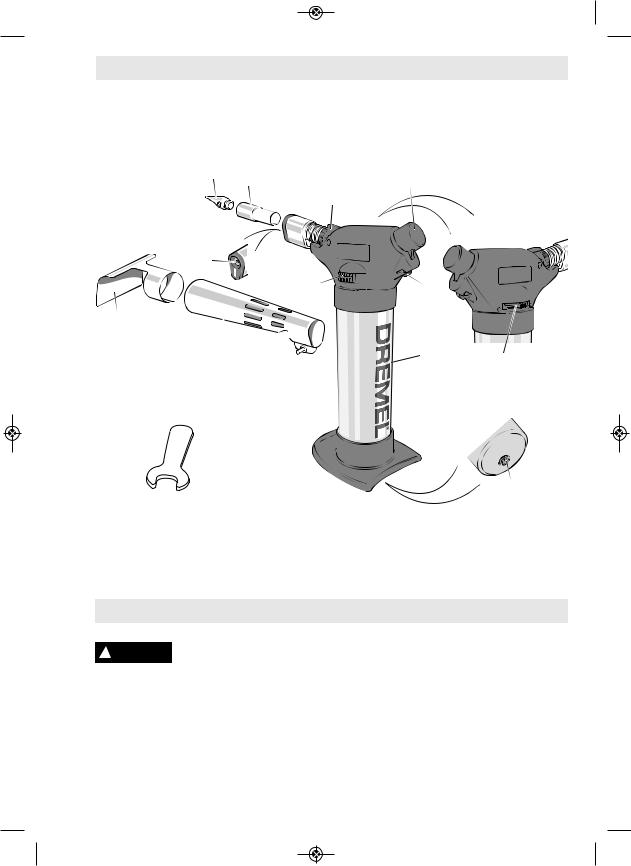
 DM 2610Z06358 A5 05-14_2200 5/7/14 1:18 PM Page 5
DM 2610Z06358 A5 05-14_2200 5/7/14 1:18 PM Page 5
Functional Description
Dremel® VersaFlame
|
Soldering Tip Flame |
Air |
|
|
Diffuser |
Ignition Button |
|
|
Control |
||
|
|
|
|
FIG. 1 |
|
Knob |
|
|
Burner |
|
|
|
Lock-On |
|
|
|
Button |
|
Safety |
lock |
|
Deflector |
|
Blower |
|
Tank |
Flame |
|
|
|
Control |
|
Slider |
Base 

|
Filling |
7mm Wrench |
Valve |
Operating Instructions
! WARNING Observe all provided warnings and safety
instructions when using the torch.
In cold weather size of flame will be smaller. To produce larger flame, pre-warm torch to room temperature prior to use.
Ensure all accessories are securely tightened before igniting the torch.
Familiarize yourself with the construction of the Dremel VersaFlame components (Figure 1), and its accessories before use.
-5-
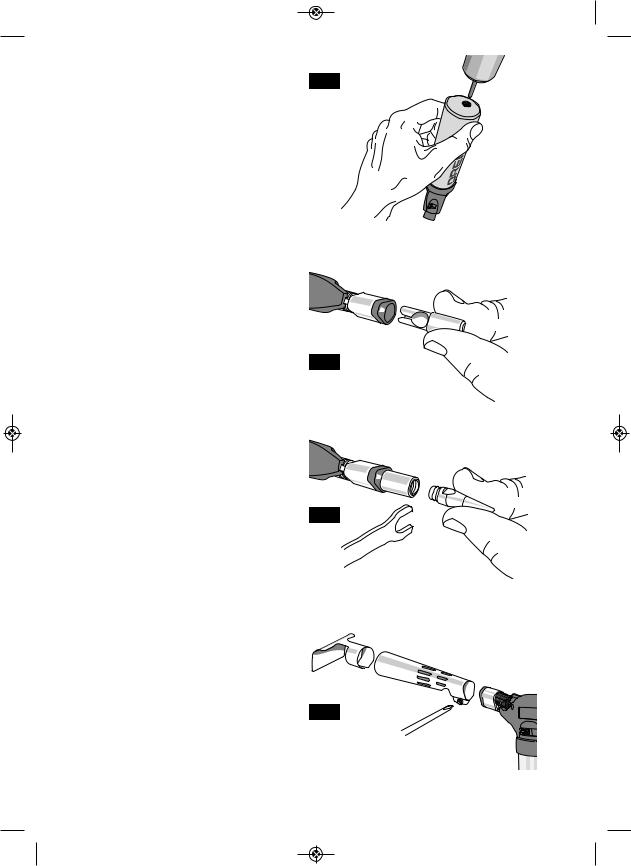
 DM 2610Z06358 A5 05-14_2200 5/7/14 1:18 PM Page 6
DM 2610Z06358 A5 05-14_2200 5/7/14 1:18 PM Page 6
Filling / Refilling Operation
Filling / refilling of the fuel tank must be done in a well-ventilated place far away from any possible sources of ignition. Be sure to observe the safety instructions and warning notices provided by the manufacturer of the liquid butane fuel. Make sure the gas you are using is a refined butane gas that can also be used for lighters.
1.Hold the VersaFlame with the Filling Valve facing up, then invert fuel container and insert the tip into the Filling Valve as shown in Figure 2.
2.Push the fuel container and torch together to allow fuel to flow into the torch fuel tank. The VersaFlame fuel tank should be filled in about 10 seconds.
3.Stop refilling once the fuel begins to escape at the Filling Valve.
4.Wait at least 3 minutes to allow fuel gas to stabilize before igniting the VersaFlame.
Installing or Changing Tips
Use of the Soldering Tip requires the Flame Diffuser to be installed. Use of the Deflector requires the Blower to be installed. Refer to Figure 1.
To install the Flame Diffuser: Slide the narrow part of the Flame Diffuser into the Burner. Make sure the slot of the Flame Diffuser is aligned with the white indicator mark on the Burner as shown in Figure 3. To remove, follow the installation steps in reverse order.
To install Soldering Tip: Thread the Soldering Tip into the Flame Diffuser and tighten using the supplied 7mm wrench as shown in Figure 4. To remove, follow the installation steps in reverse order.
To install the Blower: Loosen the screw to fit the Burner of the VersaFlame into the Blower. Secure the Blower to the VersaFlame by re-tightening the screw as shown in Figure 5 (screwdriver not included). To remove, follow the installation steps in reverse order.
To install the Deflector: Insert the Deflector into the open end of the Blower as shown in Figure 5. To remove, follow the installation steps in reverse order.
FIG. 2
FIG. 3
FIG. 4
FIG. 5
-6-
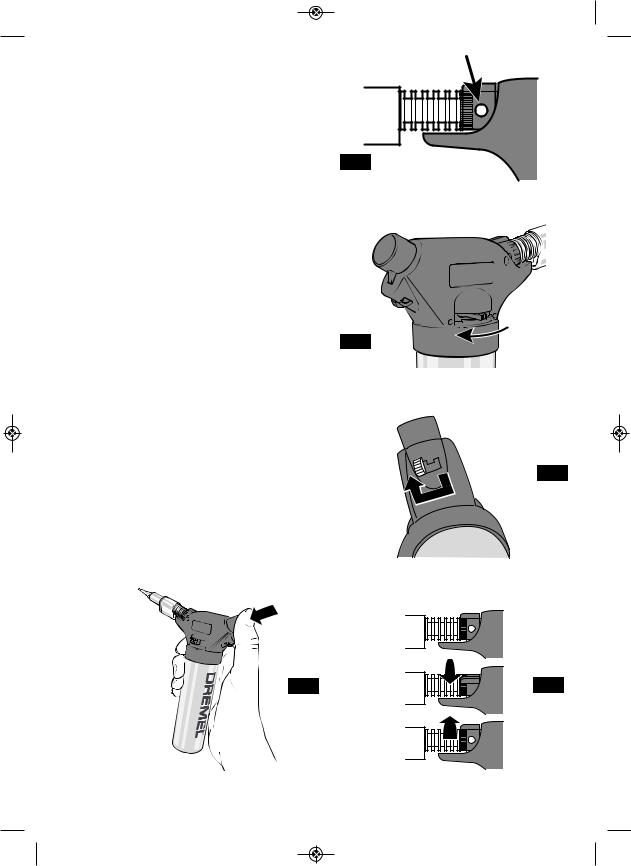
 DM 2610Z06358 A5 05-14_2200 5/7/14 1:18 PM Page 7
DM 2610Z06358 A5 05-14_2200 5/7/14 1:18 PM Page 7
Lighting and operation of the
Dremel VersaFlame
The Dremel VersaFlame is equipped with a safety mechanism intended to protect against unintended ignition.
To ignite the torch:
a.Open the Air Control Knob by aligning it as shown in Figure 6.
b.Turn the Flame Control Slider to the minimum position as shown in Figure 7.
c.Grasp the torch body placing your thumb on the Safety Lock. Using your thumb, pull down on the Safety Lock while simultaneously rotating the Safety Lock in a clockwise direction until it clicks into place on the left side of the tool as shown in Figure 8.
d.Slowly depress the Ignition Button until the torch ignites as shown in Figure 9.
e.Observe the Burner for the presence of the flame, or if using the Flame Diffuser, observe the Flame Diffuser to see if glow of the flame is visible. Also, listen for a sound of torch flame.
If there is no flame glow and the sound is of the escaping gas, then release the Ignition Button and repeat steps c and d. If ignition occurs, continue to step f.
f.If using the Flame Diffuser immediately after initial torch ignition, close the Air Control Knob for 2 seconds then immediately return it to its original position as shown in Figure 10.
FIG. 9
FIG. 6
FIG. 7
FIG. 8
FIG. 10
-7-
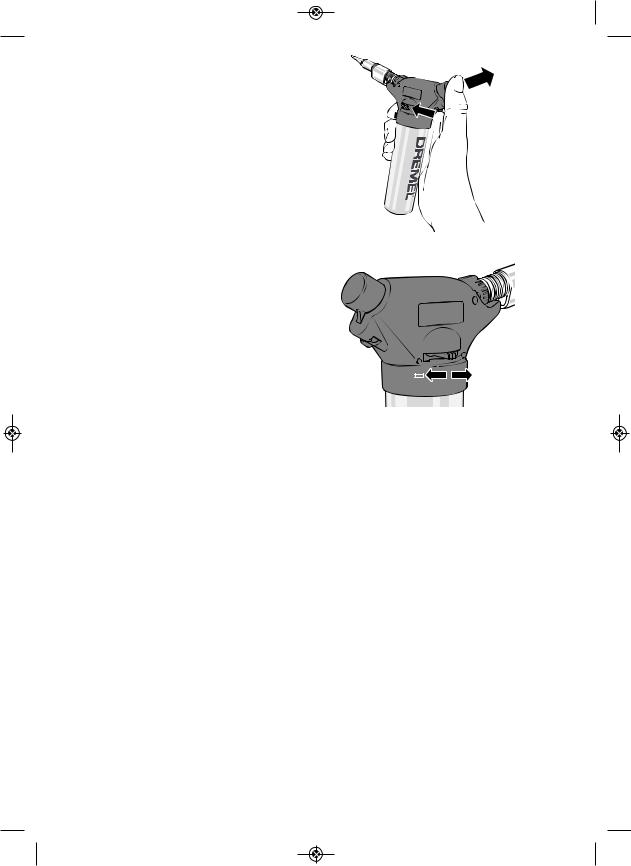
 DM 2610Z06358 A5 05-14_2200 5/7/14 1:18 PM Page 8
DM 2610Z06358 A5 05-14_2200 5/7/14 1:18 PM Page 8
g. Once the torch is ignited you can hold on |
|
|
|
|
|
|
to the Ignition Button to maintain the flame, |
|
|
|
|
|
|
or slide the Lock Button to the lock position |
|
|
|
|
|
|
for continuous operation. |
|
|
|
|
|
|
To turn off the Dremel VersaFlame, move the |
|
|
|
|
|
|
Lock-On Button to the left, if it was engaged |
|
|
|
|
|
|
during use, and let go of the Ignition Button |
|
|
|
|
|
|
as shown in Figure 11. This will immediately |
|
|
|
|
FIG. 11 |
|
stop the flow of butane gas. |
|
|
|
|
|
|
|
To extinguish torch the |
|
|
|
|
|
! WARNING |
|
|
|
|
|
|
|
lock-on button must be in |
|
|
|
|
|
|
|
|
|
|
|
|
the unlocked position. Pressing and |
|
|
|
|
|
|
releasing the ignition button will not |
|
|
|
|
|
|
extinguish the torch if the lock on button was |
|
|
|
|
|
|
moved to the lock on position during use. |
|
|
|
|
|
|
Flame Length and Temperature |
|
|
|
|
|
|
|
Adjustment |
|
|
|
|
|
Adjustment of the flame length / temperature |
|
|
|
|
|
|
can be made by adjusting the Flame Control |
|
|
|
|
|
|
Slider as shown in Figure 12. To increase |
|
|
|
|
|
|
flame length and temperature move the |
|
|
|
|
|
|
Flame Control Slider to the right. To |
|
|
|
|
|
|
decrease flame length and temperature |
|
|
|
+ |
|
|
FIG. 12 |
|
|
|
|||
move the Flame Control Slider to the left. |
|
|
|
|||
|
|
|
|
|||
When using the Soldering Tip allow 25 seconds for the tip to reach full temperature. When using only the Flame Diffuser, Blower, or Deflector, the full temperature is available immediately after ignition.
-8-
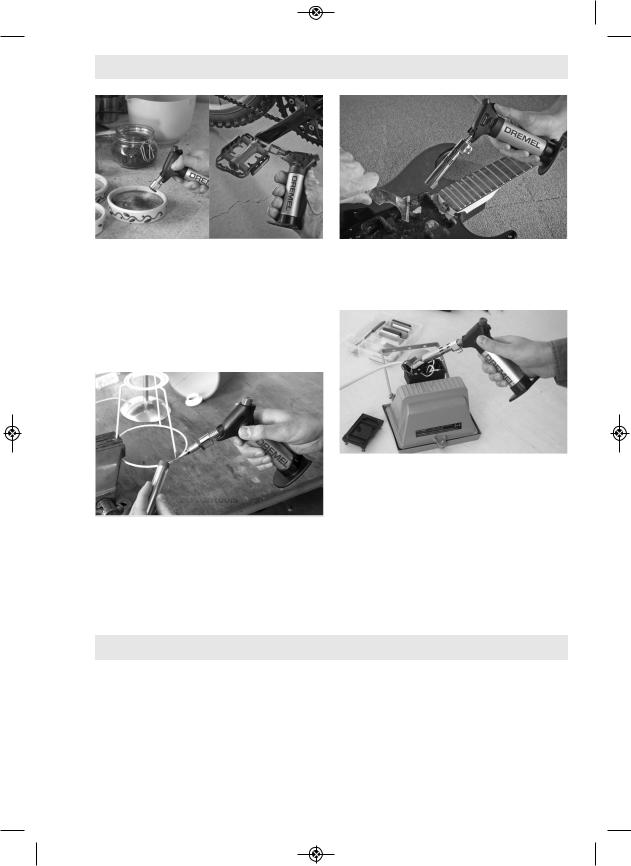
 DM 2610Z06358 A5 05-14_2200 5/7/14 1:18 PM Page 9
DM 2610Z06358 A5 05-14_2200 5/7/14 1:18 PM Page 9
Applications
Using an Open Flame
When configured for open flame, the VersaFlame can be used for tasks such as culinary caramelizing, copper pipe sweating, and freeing of seized nuts and bolts.
To use the Dremel VersaFlame with an open flame, remove the Flame Diffuser from the Burner if installed.
Using with Soldering Tip
The Soldering Tip (to be used with the Flame Diffuser) can be used for regular soldering activities including joining wire and component installation on printed circuit boards.
Using the Blower
The Blower can be used for general area heating and paint or coating removal.
Use with Deflector
The Deflector (to be used with the Blower) can be used for shrinking of heat sensitive insulation around electrical wiring and heating of other heat sensitive materials.
Maintenance & Storage
Maintenance
Clean the exterior of the tool with a clean dry cloth. If necessary, use a damp cloth.
When soldering, to clean the Soldering Tip, wipe the tip on a wet sponge while it is still hot and solder is molten.
Never clean the Soldering Tip with sandpaper as this reduces its lifetime.
Storage
Ensure that the Lock-On Button is in the unlocked position and Trigger is locked out with the Safety Lock.
Allow several minutes for torch to cool.
When torch is cool, store torch out of reach of children.
-9-
